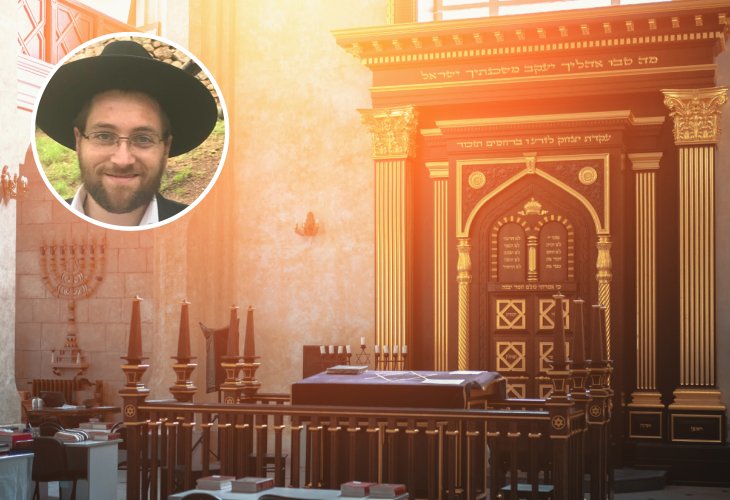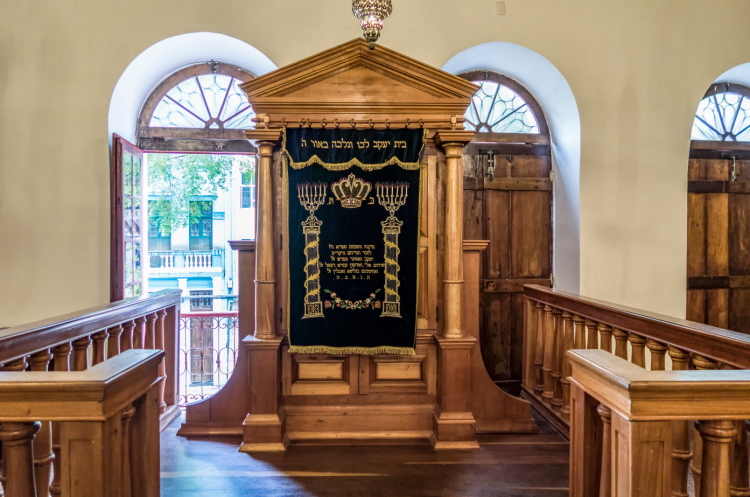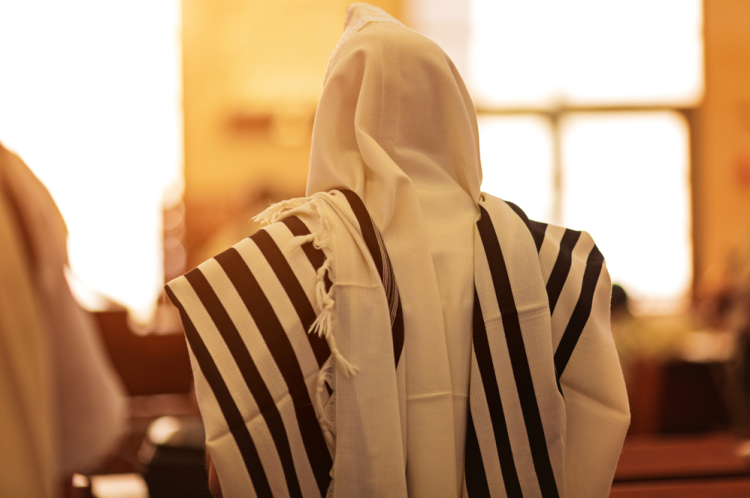"From Reform to Yeshiva Scholar at Mir": Daniel Alankwa Shares His Journey to a Life of Torah and Mitzvot
Daniel Alankwa was born in Mexico into a Reform family. In his youth, he attempted to keep his brother from embracing Orthodox Judaism, but a bicycle accident led him to an Orthodox synagogue, setting him on a path that ultimately brought him to Mir Yeshiva in Jerusalem.
 (Photo: shutterstock)
(Photo: shutterstock)Despite the passage of time, Daniel Alankwa can't forget the embarrassing incident he was at the center of during his studies at the non-Jewish school near his parents' home in Mexico. "I was a young teenager, just like any other student at school," he recounts in an interview with 'Hidabroot'. "In reality, there wasn't much difference between me and the other students. I knew I was Jewish, and they were not, and that was pretty much the extent of our differences. Then there was an incident that sharpened the distinction. Embarrassingly so."
The story took place during the holiday of Chanukah. In Alankwa's school, a play was organized in which each student was asked about the main symbols of their religion. Students of various religions proudly exhibited their faith, but when the teacher reached Alankwa, things took a wrong turn. "He asked me, 'You Jews, what is the symbol of your religion at this time?' and I answered without hesitation 'Apple dipped in honey'. Laughter erupted in the class," recalls Alankwa, who didn't even understand the problem with his answer at the time.
It turned out the non-Jewish students knew better than he did what Jews do during Chanukah and informed the embarrassed student that during this period, Jews light candles, and apples and honey are actually eaten on Rosh Hashanah. "Later, when I became a Torah-observant Jew, I learned the real story behind Chanukah: the Greeks' desire to make Jews forget their Torah. Unfortunately, at that time, I answered in alignment with the Greeks' wishes."
Alankwa, 37, was born into a family in Mexico that was not observant of Torah and mitzvot. "We were the 'secular ones of the Reform,'" he defines his family from that period. "We were so distant that those trying to bring us closer to Reform principles were actually reaching out to us. The school story, where I confused Rosh Hashanah with Chanukah, perfectly illustrates how distant we were."
Nevertheless, the Alankwa family did uphold a few basic principles that connected them to Judaism. "Once a year, we would go to synagogue. This would happen either on Rosh Hashanah or Yom Kippur. In hindsight, I think it might have been better if we didn't go at all," he says. The reason for this is the conduct in the synagogue and the journey to and from it. "We arrived at the synagogue in cars, desecrating the holiday, and there, on the most sacred days in Judaism, the prayer resembled more a Christian service. The 'service' was accompanied by a choir with organs, and there certainly was no mechitza. They left that for the 'dark' Orthodox in their view."
And there was another thing that connected the Alankwa family to Judaism: "My grandmother still remembered authentic Judaism and refused to let us entirely forsake our connection to the ancient people in history. She even knew how to speak Yiddish and during the Seder night insisted there would be matzah on the table. But we couldn't ask the Four Questions because we didn't have a situation of 'all matzah'; we ate chametz and matzah together..."
 Photo: shutterstock
Photo: shutterstock"I asked the surprised rabbi: Where is there a synagogue?"
When he grew up, Daniel left Mexico to study at a university in Canada. During this time, he learned that his brother had begun to return to the faith. "It was a real shock," he recalls. "I entered university just as he started returning to Judaism, one of the reasons I chose to study philosophy. We were very close, and I wanted to save my brother from what I saw then as the 'clutches' of Orthodox Jews who seemed very backward to me." But in the meantime, his brother deepened his hold on Judaism and moved to live in Israel, while Daniel sat for long hours trying to find questions that would supposedly refute Judaism and Orthodox beliefs.
However, during his efforts to 'save' his brother, Daniel received a phone call from his grandmother. "She asked me, even though I had left my parents' house, to ensure I would not marry a non-Jewish woman. It was one of the few things she insisted on despite our distance from Judaism. In that conversation, she also asked me to spend the upcoming Rosh Hashanah with a Jewish family. I, of course, wasn't interested. What did this have to do with me, I thought."
But grandma continued to insist: "Not long after, she called me again and told me she had a friend in Canada and strongly encouraged me to go to her house, introduce myself as her grandson and ask to spend Rosh Hashanah with her. It seemed like something I really didn't want to do, and I considered refusing."
Then Daniel found a solution to his grandmother's persuasion which came from an unexpected place: "It happened shortly before Rosh Hashanah. I was riding my bike near my study area, and while riding, I noticed someone unexpectedly approaching me. It wasn't clear whether it was due to my lack of attention or his, but the result was that I found myself on the road pavement after braking and veering sharply to avoid hitting the man."
As Daniel half sat, half leaned on the sidewalk, he looked up and realized the person he almost ran over was none other than a Jewish rabbi. Not just any rabbi, but an Orthodox one. "Instead of saying sorry, perhaps from the shock, I turned to him and asked: 'Is there a place here to pray on Rosh Hashanah?'. He seemed very surprised and asked: 'Are you Jewish?'. After I affirmed, he replied that there was a small synagogue not far from there. Just before we parted, it was important to me to ask him one more question: 'Does a place in the synagogue cost money?'. It was simply a principle for me not to pay for a place in a synagogue, based on the ideology that if one goes to a synagogue for religious purposes, why pay for it? And the rabbi answered with a smile: 'No, you don't need to pay at our place'."
Just before they parted, the rabbi turned to Daniel, shook his hand, and asked for his phone number. "I told him the number, he nodded but did not write it down. I thought it was out of politeness and he didn't really intend to take an interest. In addition, he was truly Orthodox, something I didn't know at the time, and so we parted, and I forgot about it, not planning to accept the invitation. But the next day, I get a phone call, and to my surprise, the rabbi is on the line. Later, I discovered he was truly a genius, someone who didn't need to write down a phone number to remember. It seems there are people like that..."
Rosh Hashanah, which came two days later, was unlike anything Daniel knew: "I arrived and for the first time in my life saw what a Jewish prayer is. After Rosh Hashanah, they invited me to come to Yom Kippur as well. I agreed. Why? I still can't explain it now, but I agreed, and I even came."
On Yom Kippur, Daniel had a significant spiritual experience in the synagogue: "The Yom Kippur prayer changed something in my perspective on our life's path. I particularly remember the head of the kollell who prayed with us, an outstanding person, and I saw how he cried bitterly in each confession. I was very moved. Between the prayers, which were accompanied by public announcements explaining what page we were on and what needed to be done in prayer, I tried to watch him and see his conduct. I then believed he cried not for himself but because of my sins and the sins of my friends."
 Photo: shutterstock
Photo: shutterstock"Everyone stood up for handwashing and I was sure here, Orthodox Jews are indeed clean"
The next step in Daniel's path to a life of Torah and mitzvot was the Torah lessons he began attending after the holidays. "The rabbi invited me to come to lessons, and although I was still very opposed to Judaism at the time, I persistently attended. I didn't do so out of a desire to strengthen my faith but instead wanted to refute Judaism. I would go to the lessons prepared with challenging questions, citing Aristotle or other scientific refutations. For all the questions, I received answers from the rabbi, who answered with a special kind of welcoming demeanor. What impressed me was that even if he didn't have answers at the time, he said he would find out and later returned to me with an answer."
"At a certain point, they also started inviting me to meals," Daniel recalls. "The first few times were challenging for me, as someone who knew nothing of his Judaism. The first time I ate there, everyone stood up to wash hands, and I thought, here are the Orthodox Jews indeed clean—contrary to what I thought until then. I even appreciated it, because who really adheres to the hygienic principle of washing hands before a meal?! But then, after I began talking following the hand washing, I noticed I was the only one speaking. Someone explained to me that you don't speak after washing, and that it's not just about washing the hands."
The rabbi's family accompanied Daniel further on his slow journey towards Judaism and began sending him food to the student dormitory where he stayed: "Initially, I didn't understand why, but later I realized their purpose was that I only eat kosher." In parallel, I gradually started getting closer. I left my problematic eating habits and began to keep kosher.
"Then came the more significant test: I was in a relationship with a non-Jewish woman and was thinking of marrying her. Over time, I realized I wanted to leave her. I remember that Shabbat when I experienced an emotional storm over the matter and went to the home of one of the rabbis. I arrived while he spoke words of Torah at the table. The Torah portion was Parashat Bo, and he said: 'Why is it written Bo and not le'kha? The reason is that Hashem goes with us everywhere. That's why it is written Bo, as if saying, come with me.' The rabbi then learned from a friend who had arrived with me that I was considering marrying a non-Jew, and he said to me: 'Remember what I've said, Hashem always stands by you, He comes with you.'
"Late at night, I returned to the apartment, and the rabbi's words were at the forefront of my mind, resonating constantly in my ears. I turned to her and told her that's it; I have decided to change direction."
Alankwa faced more challenges down the road. For example, he believed he could never keep Shabbat. "Even on this subject, I changed my mind after a conversation with one of the rabbis. I told him," he remembers "that I desecrated the whole Shabbat. He thought a bit and replied that I didn't desecrate the entire Shabbat. 'Only when you flip the switch, start the car, or do other prohibited actions, do you desecrate Shabbat. Actually, you're keeping most of the Shabbat.' After hearing this, I went back to my room and switched on the light, and that was the last time I desecrated Shabbat..."
"As I grew stronger in my faith, my brother got married in Israel. I came to the wedding and stayed for two weeks. After that, I returned to Canada but decided I wanted to move to Israel. And indeed, I landed in Israel shortly thereafter. Not long after, I arrived at Mir Yeshiva. I walked into one of the supervisors and told him I wanted to become a scholar. He smiled and said to me: 'You don't even know Hebrew, how can you be here?'. And today," says Daniel with emotion in his voice, "I proudly say I am a scholar, one of the thousands studying at Mir Yeshiva."
What message do you have for those who are also at a crossroads on the path to Judaism?
"I believe the most calming thing for anyone who is torn is the realization that he is not facing a 180-degree change in his lifestyle. It is possible, and indeed recommended, to make a mild and very gradual change. Another important point: always remember that the previous values you are afraid of detaching from can also be preserved after returning to the faith. Being a Torah and mitzvot observant Jew is not disconnecting from old values. On the contrary, it's about adding to them."

